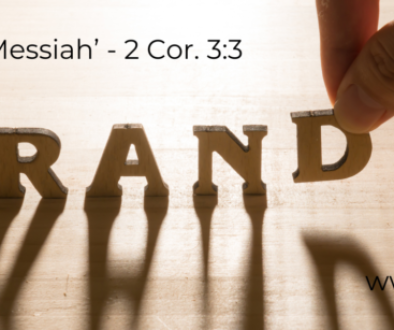The SMELL of The Offering
Our Torah class has been studying ‘The Lamp of ADONAI’ as well as the ‘lamp of the wicked’. It is important we understand these two lamps, since we are already surrendered to one of the two (and thus producing one of Two Types of Fruit).
The details of these Two Lamps can be found in Isaiah 11 and Proverbs 6.
Isaiah 11 – The Lamp of ADONAI burning within THE HOLY PRIESTHOOD is the ‘acceptable’ offering.
The Humble Offering of reverential, sacrificial love for others is what makes our offering/drawing near (korban) ‘acceptable’ before the Face of YHWH (and as we shall soon discover, His Nose, too!).
Who are the ones who are really ‘near’?
Leviticus 10:3 – NAS – Then Moses said to Aaron, “It is what the LORD spoke, saying, ‘By those who come near Me I will be treated as holy And before * all the people I will be honored.’ ” So Aaron, therefore, kept silent
Let’s parse now: Leviticus 10:3 – Those who are NEAR TREAT ME AS HOLY – THEY STAND IN FRONT OF MY FACE (therefore) the people know MY WEIGHT/GLORY KAVOD. (For more, see 1 Peter 3:8-15)
Let’s look further into The Lamp of YHWH from Isaiah 11:
Isaiah 11 Complete Jewish Bible (CJB)
11 But a branch will emerge from the trunk of Yishai,
a shoot will grow from his roots.
2 The Spirit of ADONAI will rest on him,
the Spirit of wisdom and understanding,
the Spirit of counsel and power,
the Spirit of knowledge and fearing Adonai —
3 he will be inspired by fearing Adonai.
He will not judge by what his eyes see
or decide by what his ears hear,
4 but he will judge the impoverished justly;
he will decide fairly for the humble of the land.
He will strike the land with a rod from his mouth
and slay the wicked with a breath from his lips.
5 Justice will be the belt around his waist,
faithfulness the sash around his hips.
This verse is very telling…in its Original Text.
The Ruach of ADONAI ELOHEINU ‘smells’ the offering, the Hebrew Text records the word ‘Va•ha•ri•cho’ from Strong’s #7306 ruach, meaning ‘to perceive odor, to smell what is carried on the wind’.
And from this, The Holy One either accepts the pleasing aroma or rejects the stench.

We are to examine the offering (us!) BEFORE we offer it to The King! Is it the PLEASING AROMA of ‘sincerity and truth’ OR the stench of ‘insincerity and error’?
1Therefore be imitators of God, as beloved children; 2and walk in love, just as Christ also loved you and gave Himself up for us, an offering and a sacrifice to God as a fragrant aroma. – Ephesians 5:1-2
Philippians 4:18 – But I have received everything in full and have an abundance; I am amply supplied, having received from Epaphroditus what you have sent, a fragrant aroma, an acceptable sacrifice, well-pleasing to God.
Joshua 24:14 – “Now, therefore, fear the LORD and serve Him in sincerity and truth; and put away the gods which your fathers served beyond the River and in Egypt, and serve the LORD.
1 Corinthians 5:8 – Therefore let us celebrate the feast, not with old leaven, nor with the leaven of malice and wickedness, but with the unleavened bread of sincerity and truth.
1 Peter 1:22 – Since you have in obedience to the truth purified your souls for a sincere love of the brethren, fervently love one another from the heart,
It all depends on what we have eaten, and which Lamp we are surrendered to that makes the offering either acceptable or unacceptable.
We may fool others, and especially ourselves, but The Sevenfold Spirit of ADONAI cannot be fooled.
One author wrote:
“He [the Messiah] will he imbued [vaharicho] with a spirit of fear of G-d” (Isaiah 11:3). Rava said: vaharicho means he judges by smelling [meriach].” [The Messiah will have the ability to “smell” who is guilty and who is innocent.] For the verse continues, “He will not need to judge by what his eyes see nor decide by what his ears hear. Yet he will judge the destitute with righteousness, and decide with fairness for the humble of the earth.”
Again we see the sense of smell being used as a metaphor for the ability that some people have to see the undistorted truth – without being affected by what they see or hear. What is it about our noses that give them their unique quality and special talent for being able to sniff out the truth? And why is the sense of smell – and not our sense of sight, hearing, or taste, for example – chosen by the Midrash as a metaphor for this spiritual capacity of seeing beyond someone’s external facade to the inner essence of his being? [torchweb.org]
Interested in learning Torah? Contact me, join our weekly studies, and most importantly ENGAGE IN A HOLY CIRCLE where the participants are ‘growing in faith and increasing in love’ AS ONE (2 Thessalonians 3:1).
HIS NOSE KNOWS – and yours should, too.
Baruch HaSHEM!


